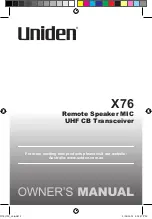
36
ENGLISH
9 /VOLUME- volume control buttons
10 ALARM 1 button
11 ALARM 2 button
12 i-ENTER button
13 i-SCROLL/PRESET / buttons
14 TUNING /SKIP / buttons (search fwd/bwd)
15 / button
First Use of the Device/Introduction
• Before the first use of the device, read the user manual
carefully.
• Select a proper place for the device such as a dry, and
even non slip area where you can easily operate the
device.
• Make sure the device is vented sufficiently.
• If still in place, remove the protection foil from the
display.
Power supply
• Insert the grid plug into a properly installed three
prong socket with 230V, 50Hz.
• Make sure the grid voltage corresponds to the figures
on the rating plate.
• In case of power interruptions all clock and station
settings will be lost.
Setting the clock (during standby mode)
1. Hold down the MEM/CLK-ADJ button (20/4) for
around 3 sec. The display will show “24 Hr”.
2. Use the / buttons (18/14) to select between
24-hour and 12-hour display setting. Confirm with
MEM/CLK-ADJ.
NOTE:
The 12-hour setting will result in the fol-
lowing display
AM = morning, PM = afternoon.
3. Use / buttons to set the hours. Confirm with
MEM/CLK-ADJ.
4. Use / buttons to set the minutes.
5. Press MEM/CLK-ADJ again in order to save the time
settings.
Insert batteries
NOTE:
Where necessary, the lithium cell in the battery com-
partment of the remote has been fitted with a protec-
tive foil for transport. This extends the lifetime of the
battery. Before initial use please remove this foil to
prepare the remote for use.
The battery in the remote is a long-life lithium cell. Should
the range of the remote shorten during use, follow the
steps below:
• Open the battery compartment on the underside of
the remote.
• Replace the cell with a battery of the same type
(CR 2032). Make sure the polarity is correct.
• Close the battery compartment.
If the remote is not in use for a lengthy period of time,
please remove the battery to prevent the battery acid
from “leaking”.
WARNING:
• Do not expose batteries to intense heat or direct
sunlight. Never throw batteries onto a fire.
Danger
of explosion!
• Keep batteries out of the reach of children. They are
not
toys.
• Do not force batteries open.
• Avoid contact with metallic objects. (Rings, nails,
screws etc.)
Danger of short circuits!
• Short circuits may overheat or even ignite batteries.
This may lead to combustion.
• When transporting the batteries, cover the terminals
for your safety with an adhesive strip.
• If a battery leaks, do not rub the fluid into the eyes
or the skin. If acid comes into contact with the eyes,
rinse with purified water and seek medical advice if
symptoms persist.
CAUTION:
Do not dispose of batteries with household waste. Please
take used batteries to an authorised collection point or
to a dealer.
Headphone jack (14)
For headphone operation, use a headphone with a 3.5mm
stereo jack plug, connecting it to the PHONES jack. The
speakers will be muted.
iPod Compatibility
Due to the many different iPod-Models and generations
currently available on the market, full compatibility can-
not be guaranteed. Before connecting your iPod, ensure
that it has a compatible interface.
Full compatibility of the remote functions also cannot
be guaranteed. If necessary therefore use your iPod as
normal, whilst it is plugged into the Docking Station.
General Operation
NOTE:
Some buttons you can find as well on the device as on
the remote control.
Identical buttons effect the same function.
















































